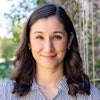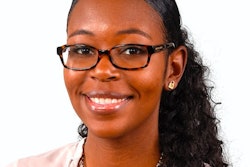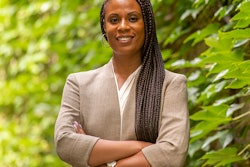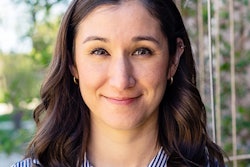Title: Assistant Professor of Psychology, Delaware State University
Tenured: No
Age: 39
Education: B.S., psychology, University of Maryland, Baltimore County; and Ph.D., health psychology, East Carolina University
Career mentors: Dr. Jeannie Golden, East Carolina University; Dr. Diane Finley, Prince George’s Community College; and Dr. Christine McDermott, Delaware State University
Words of wisdom/advice for new faculty members: “Don’t stretch yourself out too thin. Learn how to say no as a junior faculty member but say it with poise and some grace. The more that you’re straightforward with the time that you have, the more that you can make those decisions of whether to take on something.”
Dr. Albee Mendoza’s parents wanted her to go into medicine, study biology and chemistry, and ultimately become a doctor or nurse. She decided to respect their wishes but do so with a twist by going into psychology instead.
“I kind of defied them a little bit and said, ‘I want to help with peoples’ mental health and talk a little bit about how maybe bullying or trauma or domestic abuse can also impact their actual health, in addition to their physical health,’” says Mendoza, a first-generation Filipino immigrant who came to the U.S. at age 7.
Mendoza is roughly a decade into her teaching career, one that has been tumultuous due to circumstances outside her control. Yet, the assistant professor of psychology at Delaware State University (DSU) persists and chooses to move forward at each challenge with her work in psychology and for students.
Mendoza’s interest began in college, where she took a role as a behavioral support aide assisting a child with autism, she says. The experience made her want to learn more. So, she later pursued her doctorate in the psychology field.
As the first person in her family to go to a U.S. college, Mendoza understands the hurdles and confusing processes that surround higher ed. She tries to help her students navigate some of them, such as the FAFSA process and the registrar. She also aims to get students, especially first-generation students, involved in the fields of psychology and mental health from the get-go, she says, starting them on the track while they’re in college.
“I identify with a lot of my students who are [for] the first time coming here,” Mendoza says.
Previously a professor of psychology at Wesley College from 2016 to 2021, Mendoza teaches under and upperclassmen on matters such as human development, educational psychology, health psychology, autism spectrum disorders, and applied behavior analysis. In doing so, she serves as a mentor to a variety of students and promotes service learning.
“One of the biggest joys in my work is making sure that my students have service learning or experiential learning opportunities,” Mendoza says.
In pursuit of exposing students to these opportunities, Mendoza was able to partner Wesley with the local John S. Charlton School for college-age students with special needs. She says she became one of the few professors to have such a partnership. As a result, her students are given the opportunity to work with special needs students on projects.
Diligent in her work, Mendoza managed to earn tenure at Wesley. But by 2021, and the acquisition of Wesley by DSU, she lost tenure and was relegated to the role of visiting faculty. She subsequently made the climb back to tenure-track professor. She prides herself on her persistence in the face of an institutional change that she had little control over.
“I don’t think that people understood how earth-shattering that is to your professional identity but also your personal identity — that milestone reached and then you’ve got to start over,” Mendoza says.
Her tenure loss and other pressures – she is a junior faculty member and one of the only Asian people in her academic building – led to her stretching herself too thin sometimes, she says. And back when she was 35, she was diagnosed with ovarian cancer, resulting in a radical hysterectomy and six rounds of chemotherapy. Yet, Mendoza powered through, says Dr. Diane L. Finley, professor of social sciences and psychology at Prince George’s Community College.
Finley says Mendoza was committed to helping others even as she battled cancer.
“I think she is one of the rising stars within the teaching community, given some of her health challenges that she had to deal with, which you would never have known,” Finley says. “If you didn’t know what was going on, you would not have known.”
As a Filipina, Mendoza brings a unique perspective to the academy, Finley says, adding that she also serves as a great representative for minority students, DEI-oriented psychology professors, and junior faculty looking to get involved with their communities and professional organizations.
“I love my students. I love my teaching. I love my work,” Mendoza says.


















